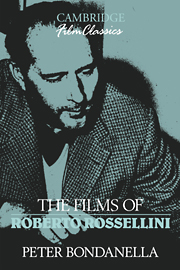Book contents
- Frontmatter
- Contents
- List of Illustrations
- Preface
- 1 Rossellini and Realism: The Trajectory of a Career
- 2 L'uomo dalla croce: Rossellini and Fascist Cinema
- 3 Roma città aperta and the Birth of Italian Neorealism
- 4 Paisà and the Rejection of Traditional Narrative Cinema
- 5 La macchina ammazzacattivi: Doubts about the Movie Camera as a Morally Redemptive Force
- 6 Viaggio in Italia: Ingrid Bergman and a New Cinema of Psychological Introspection
- 7 Il generale Della Rovere: Commercial Success and a Reconsideration of Neorealism
- 8 La prise de pouvoir par Louis XIV: Toward a Didactic Cinema for Television
- Notes
- Chronology
- Filmography
- Bibliography
- Index
7 - Il generale Della Rovere: Commercial Success and a Reconsideration of Neorealism
Published online by Cambridge University Press: 12 January 2010
- Frontmatter
- Contents
- List of Illustrations
- Preface
- 1 Rossellini and Realism: The Trajectory of a Career
- 2 L'uomo dalla croce: Rossellini and Fascist Cinema
- 3 Roma città aperta and the Birth of Italian Neorealism
- 4 Paisà and the Rejection of Traditional Narrative Cinema
- 5 La macchina ammazzacattivi: Doubts about the Movie Camera as a Morally Redemptive Force
- 6 Viaggio in Italia: Ingrid Bergman and a New Cinema of Psychological Introspection
- 7 Il generale Della Rovere: Commercial Success and a Reconsideration of Neorealism
- 8 La prise de pouvoir par Louis XIV: Toward a Didactic Cinema for Television
- Notes
- Chronology
- Filmography
- Bibliography
- Index
Summary
In a 1970 interview, Rossellini rejected dramatization and the search for effects in the cinema as falsifications of reality. He also remarked that Il generale Delia Rovere was a “constructed film, a professional film, and I do not make professional films, only films that we can call experimental.” However, in the wake of Rossellini's long string of commercially unsuccessful films, the director was desperate for financial backing, and when the critical success of his documentary on India at the Cannes Film Festival gave his tarnished reputation a breath of oxygen, Rossellini's opportunistic nature lost no time in assembling a project that would have commercial potential. Using a short story by the Italian journalist Indro Montanelli that was selected in May 1959, Rossellini and his scriptwriters (Sergio Amidei, Diego Fabbri, Piero Zuffi, and Montanelli) turned out a script in less than a month. Because Rossellini's commercial backers needed to introduce the work at the Venice Biennale in late August of that same year to guarantee a return on their investment, shooting was completed in an amazing four weeks' time. The completely edited work was presented at the end of August in Venice, where it was awarded the major festival prize, the Golden Lion Award, together with Mario Monicelli's La grande guerra (The Great War). When Il generale Delia Rovere was released commercially, it earned over 650 million lire, more than forty times the box-office receipts he had obtained with Viaggio in Italia, and the film cost a paltry $300,000 to make.
- Type
- Chapter
- Information
- The Films of Roberto Rossellini , pp. 112 - 124Publisher: Cambridge University PressPrint publication year: 1993



